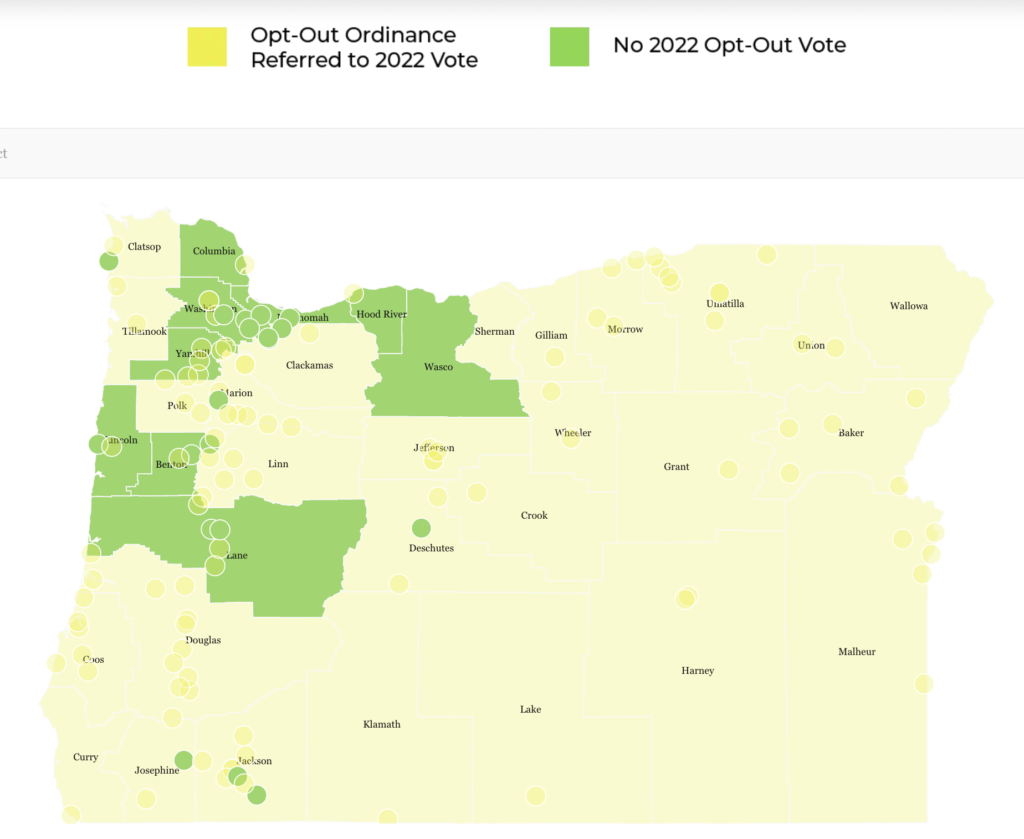
Oregon Votes Again on Medicinal Psilocybin
This time it’s local: Two-thirds of Oregon counties will decide whether to allow or ban therapeutic psilocybin.
In 2020, Oregon made history when voters passed Measure 109 that would legalize the medicinal use of psilocybin under the care of a licensed intermediary. It was accepted with 56% of the votes.
But this November, exactly two years later, residents in two-thirds of Oregon’s 36 counties will vote to ban psilocybin therapy centers or institute a two-year moratorium on those services. Local governments retain the power to put such a vote on the ballot.
None of the state’s ten largest cities will vote. That means psilocybin therapy centers will be allowed in cities like Portland, Eugene, Salem, and Bend.
Information on which Oregon cities and counties are considering voting against medicinal psilocybin on November 8 was collected by Psychedelic Alpha, Emerge Law Group and Calyx Law in a map below.
Who’s Voting On Medical Psilocybin On November 8th In Oregon?

Similar to cannabis get-out clauses
The state’s opt-out policy for psilocybin is consistent with cannabis legalization laws in most states: residents can vote to ban sales but not recriminalize possession.
In the case of Oregon, voters in 2020 also passed Measure 110, which decriminalized possession of small amounts of any drug.
In August of this year, the Oregon Health Authority (OHA) completed the rollout of its remaining proposed rules for the program, including advertising guidelines, safety guidelines to ensure patients travel home safely, licensing fees and more. Action 109 requires OHA to finalize the program rules by January 1, 2023. Insiders expect the program to launch later in 2023.
Read on to learn more about the opt-out process, which counties will vote on November 8 to reject or postpone the program, and the proposed rules themselves.
Related
Where are Psychedelics Legal or Decriminalized in the US?
Why is opt-out an option at all?
According to Sam Chapman, campaign manager for the successful “Measure 109” campaign, without the option to opt-out, the controversial initiative would have had less chance of passing in 2020.
“The inclusion of the opt-out option was a political calculation that we made. We thought: what kind of opposition might emerge during the campaign if we don’t do that?” Chapman told the Microdose newsletter last month, adding that “people will fight tooth and nail” to campaign defeat those trying to override the local government.
In a recent interview with the Oregon Capital Chronicle, Chapman showed sympathy for the counties that didn’t vote for Measure 109 and are now trying to opt out.
“It doesn’t surprise me that there are a handful of cities and counties that voted against Measure 109 and still don’t want it in their community,” Chapman said. “That’s absolutely fair. That makes sense to me. And they should have that ability.”
Related
Leafly Report: ‘Opt-out’ cities encourage illicit marijuana sales
However, when it comes to counties that voted for Measure 109 where local leaders have nonetheless imposed an opt-out or moratorium on the November election, Chapman took a different tone.
“What doesn’t make sense to me is that elected officials who know how their county or city voted on Measure 109 would refuse to educate themselves on the issue and then broadcast it back to voters. I think that’s probably not going to look good if voters decide they still want this program,” Chapman said.
Opting-out votes can have unintended consequences. As authors Bruce Barcott and Beau Whitney found in Leafly’s recently published 2022 Opt-Out Report, locations that ban state-regulated retail cannabis stores tend to protect and promote their local illicit marijuana market. However, whether such correlations hold true with psilocybin remains to be seen. Furthermore, the comparison may not even be accurate, since any psilocybin use outside of a state-sanctioned treatment would thus be considered illegal.
Related
Oregon just legalized medicinal psilocybin. Here’s what happens next
What are the rules for Oregon’s psilocybin medicine program?
After Oregon voters passed Measure 109 in 2020, OHA began working with the newly formed Oregon Psilocybin Advisory Board to draft rules for the program. These rules were released bit by bit throughout the year. In late August, OHA presented their final set of proposed rules.
These rules include these highlights:
- Therapeutic centers are only allowed to have up to 100 grams of psilocybin on-site at any given time, and manufacturers are only allowed to have double that — 200 grams — at a time.
- A “serving” of psilocybin must not exceed 25 milligrams. The rules also allow smaller doses. A patient must not consume more than two “servings” during a session.
- Group sessions are allowed.
- License fees include $10,000 for manufacturers, service centers and laboratories. A facilitator license costs $2,000. The state is offering a 50% discount to some qualified applicants,
- Manufacturing facilities, testing labs, and service centers may not share their locations with a licensee or registrant for medicinal or adult use cannabis, a liquor store, healthcare facility, restaurant, or private residence.
- Service centers must not be located within 300 meters of a school or any designated residential area.
- All psilocybins must be grown in Oregon. Service centers may not give it away for free.
Interested readers can find a summary of the proposed rules, written by attorney Vince Sliwoski, here.
Max Savage Levenson
Max Savage Levenson probably has the lowest cannabis tolerance of any author on the cannabis beat. He also writes about music for Pitchfork, Bandcamp and other bespectacled people. He is the co-host of the Hash podcast. His dream interview is Tyler the Creator.
Check out Max Savage Levenson’s articles
By submitting this form, you are subscribing to Leafly news and promotional emails and agreeing to Leafly’s Terms of Service and Privacy Policy. You can unsubscribe from Leafly email communications at any time.

Post a comment: